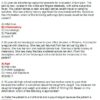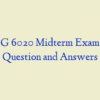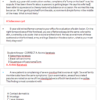Description
NSG 6020 Week 6 Quiz with Answers
- A 42-year-old florist comes to your office, complaining of chronic constipation for the last six months. She has had no nausea, vomiting, or diarrhea, and no abdominal pain or cramping. She denies any recent illnesses or injuries. Shedenies any changes to her diet or exercise program. She is on no new medications. During the review of systems (ROS), you note that she has felt fatigued, had some weight gain, has irregular periods, and has cold intolerance. Her past medical history is significant for one vaginal delivery and two cesarean sections. She is married, has three children, and owns a flower shop. She denies tobacco, alcohol, or drug use. Her mother has type 2 diabetes and her father has coronary artery disease. There is no family history of cancers. On examination, she appears her stated age. Her vital signs are normal. Her head, eyes, ears, nose, throat, and neck examinations are normal. Her-cardiac, lung, and abdominal examinations are also unremarkable. Her rectal occult blood test is negative. Her-deep tendon reflexes are delayed in response to a blow with the hammer, especially the Achilles tendons.What is the best choice for the cause of her constipation?
- A 76-year-old retired farmer comes to your office complaining of abdominal pain, constipation, and a low-grade fever for about three days. He denies any nausea, vomiting, or diarrhea. The only unusual thing he remembers eating is two bags of popcorn at the movies with his grandson, three days before his symptoms began. He denies any other recent illnesses. His past medical history is significant for coronary artery disease and high blood pressure. He has been married for over fifty years. He denies any tobacco, alcohol, or drug use. His mother died of colon cancer and his father had a stroke. On examination, he appears his stated age and is in no acute distress. His temperature is 100.9 degrees and his other vital signs are unremarkable. His head, cardiac, and pulmonary examinations are normal. He has normal bowel sounds and is tender over the left lower quadrant. He has no rebound or guarding. His rectal examination is unremarkable and his fecal occult blood test is negative. His prostate is slightly enlarged but his testicular, penile, and inguinal examinations are all normal. Blood work is pending.What diagnosis for abdominal pain best describes his symptoms and signs?
- A 26-year-old sports store manager comes to your clinic, complaining of severe right-sided abdominal pain for twelve hours. He began having a stomachache yesterday, with a decreased appetite, but today the pain seems to be just on the lower right side. He has had some nausea and vomiting but no constipation or diarrhea. His last bowel movement was the night before and was normal. He has had no fever or chills. He denies any recent illnesses or injuries. His past medical history is unremarkable. He is engaged. He denies any tobacco or drug use and drinks four to six beers per week. His mother has breast cancer and his father has coronary artery disease. On examination, he appears ill and is lying on his right side. His temperature is 100.4 degrees and his heart rate is 110. His bowel sounds are decreased and he has rebound and involuntary guarding, one-third of the way between the anterior superior iliac spine and the umbilicus in the right lower quadrant (RLQ). Hisrectal, inguinal, prostate, penile, and testicular examinations are normal.What is the most likely cause of his pain? nsg 6020 week 6
- Jim is a 60-year-old man who presents with vomiting. He denies seeing any blood with emesis, which has been occurring for two days. He does note a dark, granular substance resembling the coffee left in the filter after brewing. What do you suspect?
- Josh is a 14-year-old boy who presents with a sore throat. On examination, you notice dullness in the last intercostal space in the anterior axillary line on his left side with a deep breath. What does this indicate?
- Which is the proper sequence of examination for the abdomen?
- A 57-year-old maintenance worker comes to your office for evaluation of pain in his legs. He has smoked two packs per day since the age of sixteen, but is otherwise healthy. You are concerned that he may have peripheral vascular disease. Which of the following is part of common or concerning symptoms for the peripheral vascular system?
- A 55-year-old secretary with a recent history of breast cancer, for which she underwent surgery and radiation therapy, and a history of hypertension comes to your office for a routine checkup. Which of the following aspects of the physical are important to note when assessing the patient for peripheral vascular disease in the arms? nsg 6020 week 6
- Diminished radial pulses may be …..in patients with which of the following?
- You are assessing a 59-year-old gas station owner for atherosclerosis in the lower extremities. In which of the following locations would the patient’s pain make you concerned for this disease process?
- Chris is a 20-year-old college student who has had abdominal pain for three days. It started at his umbilicus and was associate with nausea and vomiting. He was unable to find a comfortable position. Yesterday, the pain became more severe and constant. Now, he hesitates to walk, because any motion makes the pain much worse. It is localized just medial and inferior to his iliac crest on the right. Which of the following is most likely?
- Which of the following is consistent with obturator sign?
- A young patient presents with a left-sided mass in her abdomen. You confirm that it is present in the left upper quadrant (LUQ). Which of the following would support that this represents an enlarged kidney rather than her spleen?
- Mr. Maxwell has noticed that he is gaining weight and has increasing girth. Which of the following would argue for the presence of ascites? nsg 6020 week 6
- An elderly woman with a history of coronary bypass comes in with severe, diffuse, abdominal pain. Strangely, during your examination, the pain is not made worse by pressing on the abdomen. What do you suspect?
- A day care worker presents to your office with jaundice. She denies IV drug use, blood transfusion, and travel, and has not been sexually active for the past ten months. Which type of hepatitis is most likely?
- Cody is a teenager with a history of leukemia and an enlarged spleen. Today he presents with fairly significant left upper quadrant (LUQ) pain. On examination of this area, a rough grating noise is heard. What is this sound?
- Mr. Kruger is an 84-year-old who presents with a smooth lower abdominal mass in the midline which is minimally tender. There is dullness to percussion up to 6 cm above the symphysis pubis. What does this most likely represent?
- Bill, a 55-year-old man, presents with pain in his epigastrium which lasts for 30 minutes or more at a time and has started recently. Which of the following should be considered?







